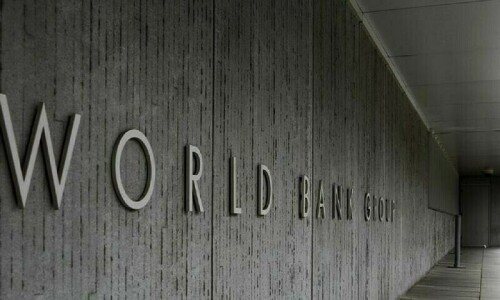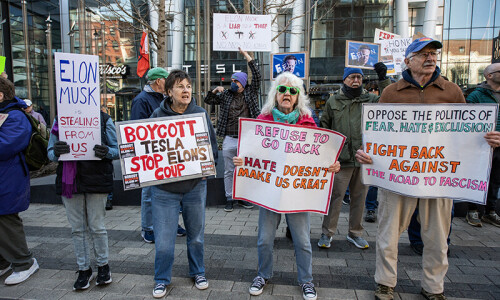THERE is a degree of irony — or déjà vu — in recent reports that putative US presidential candidate Robert F. Kennedy Jr is losing some support because of his admiration for Israel even as it pursues a genocidal military campaign. Some 55 years ago, his father — who, unlike RFK Jr, had a convincing chance of winning the Democratic primaries and then the White House — was assassinated, purportedly by a Jordanian-Palestinian, Sirhan Bishara Sirhan, enraged by the candidate’s pledge, if elected, to send 50 Phantom jet fighters to Israel.
That was in 1968, on the first anniversary of the Six-Day War that dramatically shifted American attitudes towards Israel. Bobby Kennedy was then seen as a progressive candidate. He vowed to pull US troops out of Vietnam, and appeared to sincerely empathise with African Americans still struggling for civil rights as well as the broader victims of poverty engendered by the American way of life.
Whether he might have made a decent president is hard to say, but he would no doubt have been a better option than the Republican nominee, Richard Nixon, whom his elder brother John F. Kennedy had narrowly defeated eight years earlier. There were suggestions the 1960 poll might have been rigged on the margins — JFK even joked about it. But much of that was forgotten when he was assassinated in Dallas 60 years ago today.
That tragedy haunted RFK, who feared that in his role as attorney general in the Kennedy administration, he might have stirred up sufficient resentment in his pursuit of organised crime to provoke a deadly backlash. There were many other factors, though.
As a candidate, JFK had placed himself on the anti-communist extreme, but as president he turned down the option of providing air cover to the CIA-sponsored invasion of Cuba by anti-Castro exiles, which had been green-lit by the previous Eisenhower administration. In his departing address to the nation, Dwight Eisenhower pointed out the risks posed by the burgeoning military-industrial complex, but the former supreme commander had done little to curtail it. It was his successor who stood up to the generals and the CIA.
JFK accepted responsibility for the 1961 Bay of Pigs disaster, when CIA-trained infiltrators were decisively thwarted by Cuban revolutionary forces. More crucially, he turned down the gung-ho military commanders who advocated an assault on Cuba the following year, when it turned out that the USSR had deployed nuclear-armed missiles on the Caribbean island close to Florida.
The JFK cover-up unleashed US distrust in government.
Back-channel contacts in which RFK played a key role ascertained that Soviet leader Nikita Khrushchev was as reluctant as JFK to risk a nuclear conflagration. Moscow did not hesitate to pull out its warheads as soon as Washington vowed not to invade the island, as well as to withdraw its missiles from Turkey’s Soviet border. Thanks in large part to Daniel Ellsberg, we know that Kennedy was well aware of the global toll a nuclear conflagration would entail, and he wasn’t prepared to go there. Whether his assassination in Dallas was blowback for any of his policy decisions or predilections remains a mystery. A recent poll suggests that 65 per cent of Americans don’t buy the single-gunman theory about the events of Nov 22, 1963.
That’s not surprising, given the plethora of contradictory evidence, including the fact that Lee Harvey Oswald never owned up to the deed, and was himself murdered less than 48 hours later by Jack Ruby, a strip-club owner with underworld and FBI connections. In the absence of definitive answers, the unanswered questions keep piling up.
RFK Jr is convinced the CIA had a role in his uncle’s assassination. That has never conclusively been proved, even though the sordid nexus between the agency, the mafia and anti-Castro Cuban exiles is reasonably well documented. There are also unresolved discrepancies in the official narratives about the 1968 assassinations of Martin Luther King and RFK, and some members of both families suspect that the actual killers went free. It’s worth noting that a couple of those accused of Malcolm X’s assassination in 1965 were only recently exonerated.
One of the factors RFK Jr is capitalising on is the visceral distrust of the government that went mainstream not long after his uncle was murdered, and multiplied within a decade with the Pentagon Papers that laid bare the history of deceptions about Vietnam, not to mention Watergate, which followed shortly afterwards. More recently, there was the nonsense about weapons of mass destruction that served as an excuse to invade Iraq — and echoes of that deception resonate through Israel’s nonsensical allegations about Gaza’s Al Shifa hospital.
Distrust of the established order contributed to Donald Trump’s triumph in 2016, and may serve him well again next year. RFK Jr is probably helping to pave the way.
Published in Dawn, November 22th, 2023











































